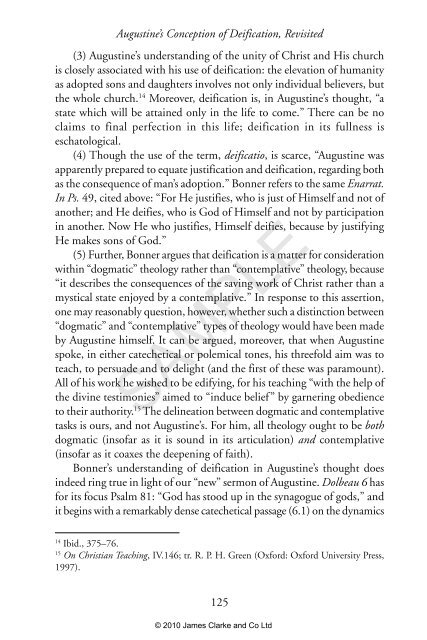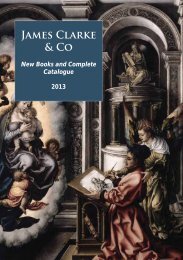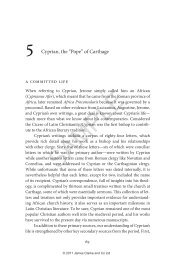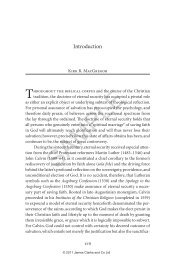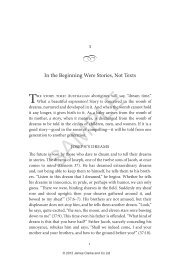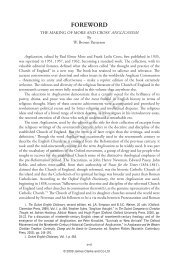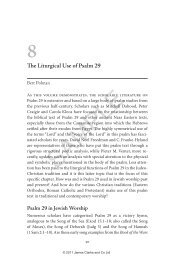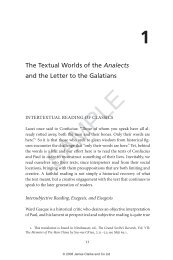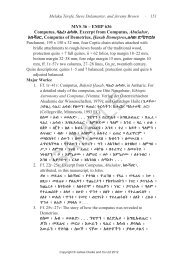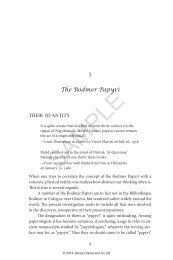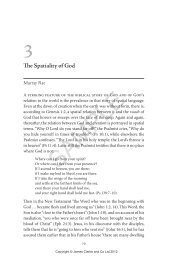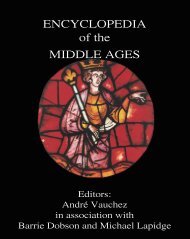Augustine's Conception of Deification, Revisited - James Clarke and ...
Augustine's Conception of Deification, Revisited - James Clarke and ...
Augustine's Conception of Deification, Revisited - James Clarke and ...
Create successful ePaper yourself
Turn your PDF publications into a flip-book with our unique Google optimized e-Paper software.
Augustine’s <strong>Conception</strong> <strong>of</strong> <strong>Deification</strong>, <strong>Revisited</strong><br />
(3) Augustine’s underst<strong>and</strong>ing <strong>of</strong> the unity <strong>of</strong> Christ <strong>and</strong> His church<br />
is closely associated with his use <strong>of</strong> deification: the elevation <strong>of</strong> humanity<br />
as adopted sons <strong>and</strong> daughters involves not only individual believers, but<br />
the whole church. 14 Moreover, deification is, in Augustine’s thought, “a<br />
state which will be attained only in the life to come.” There can be no<br />
claims to final perfection in this life; deification in its fullness is<br />
eschatological.<br />
(4) Though the use <strong>of</strong> the term, deificatio, is scarce, “Augustine was<br />
apparently prepared to equate justification <strong>and</strong> deification, regarding both<br />
as the consequence <strong>of</strong> man’s adoption.” Bonner refers to the same Enarrat.<br />
In Ps. 49, cited above: “For He justifies, who is just <strong>of</strong> Himself <strong>and</strong> not <strong>of</strong><br />
another; <strong>and</strong> He deifies, who is God <strong>of</strong> Himself <strong>and</strong> not by participation<br />
in another. Now He who justifies, Himself deifies, because by justifying<br />
He makes sons <strong>of</strong> God.”<br />
(5) Further, Bonner argues that deification is a matter for consideration<br />
within “dogmatic” theology rather than “contemplative” theology, because<br />
“it describes the consequences <strong>of</strong> the saving work <strong>of</strong> Christ rather than a<br />
mystical state enjoyed by a contemplative.” In response to this assertion,<br />
one may reasonably question, however, whether such a distinction between<br />
“dogmatic” <strong>and</strong> “contemplative” types <strong>of</strong> theology would have been made<br />
by Augustine himself. It can be argued, moreover, that when Augustine<br />
spoke, in either catechetical or polemical tones, his threefold aim was to<br />
teach, to persuade <strong>and</strong> to delight (<strong>and</strong> the first <strong>of</strong> these was paramount).<br />
All <strong>of</strong> his work he wished to be edifying, for his teaching “with the help <strong>of</strong><br />
the divine testimonies” aimed to “induce belief” by garnering obedience<br />
to their authority. 15 The delineation between dogmatic <strong>and</strong> contemplative<br />
tasks is ours, <strong>and</strong> not Augustine’s. For him, all theology ought to be both<br />
dogmatic (ins<strong>of</strong>ar as it is sound in its articulation) <strong>and</strong> contemplative<br />
(ins<strong>of</strong>ar as it coaxes the deepening <strong>of</strong> faith).<br />
Bonner’s underst<strong>and</strong>ing <strong>of</strong> deification in Augustine’s thought does<br />
indeed ring true in light <strong>of</strong> our “new” sermon <strong>of</strong> Augustine. Dolbeau 6 has<br />
for its focus Psalm 81: “God has stood up in the synagogue <strong>of</strong> gods,” <strong>and</strong><br />
it begins with a remarkably dense catechetical passage (6.1) on the dynamics<br />
SAMPLE<br />
14<br />
Ibid., 375–76.<br />
15<br />
On Christian Teaching, IV.146; tr. R. P. H. Green (Oxford: Oxford University Press,<br />
1997).<br />
125<br />
© 2010 <strong>James</strong> <strong>Clarke</strong> <strong>and</strong> Co Ltd


